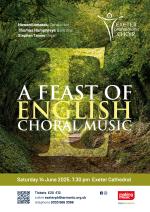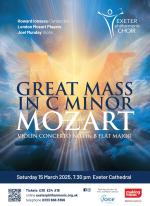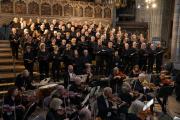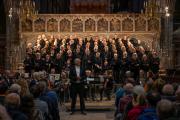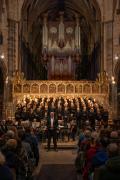THE Weather Book - an exciting EPC commission
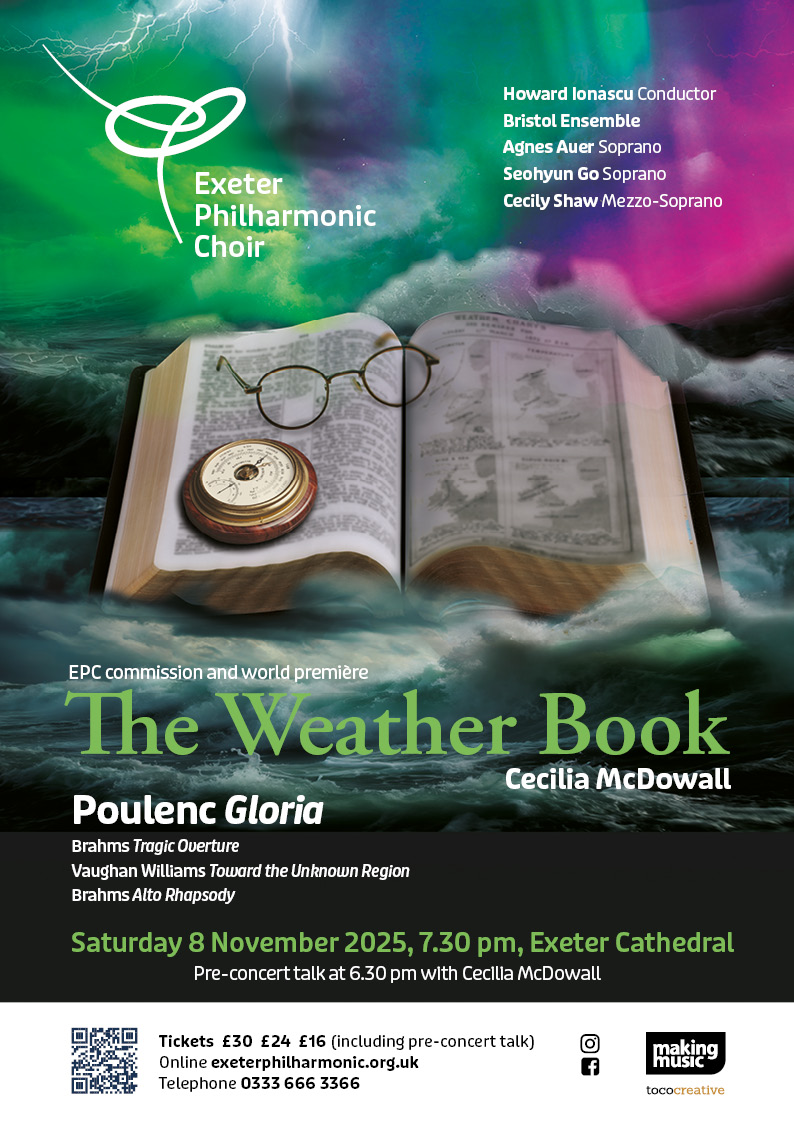
To start, Director of Music Howard Ionascu conducted the Bristol Ensemble in Brahms’ Tragic Overture. Although there was much fine playing from the instrumentalists (as throughout the concert), the wind and brass rather over-dominated the strings, reducing the contrasts and vitality of the music.
The choir’s first contribution to the evening was in Poulenc's Gloria, not an easy work to perform. This non-traditional setting of the text requires choir and orchestra to be on their toes given the wide dynamics and moods and alternating lyricism and dissonance. Most of the challenges were well met under Howard Ionascu’s lively direction. The work’s lyrical moments are led by a soprano soloist and Seohyun Go sang with a sure sense of serenity and beauty.
And now to the new work that ended the first part of the concert. Cecilia McDowall writes music that is both enjoyable to perform and accessible to listen to and The Weather Book is no different. This is not the first time that she has composed choral works with the environment as their theme, including The Shipping Forecast, 70 Degrees Below Zero and The Ice is Listening. To a text by Kate Wakeling, The Weather Book marks the contribution to our understanding of climate and meteorology by three scientists: Celsius, Eunice Newton Foote (shamefully ignored in 19th-century American scientific circles) and Robert FitzRoy. Intriguingly, the score includes explicit references to ‘atmospheric’, ‘boiling point’, ‘airy’ and ‘temperate’ to set the appropriate mood for soprano soloist, choir and orchestra, while Wakeling's words draw directly on those of the three scientists.
The first (‘Celsius Rising’) and longest of the three movements sees the soprano soloist given prominence over a supportive chorus against the attractive orchestration to be found throughout the work. Soprano Agnes Auer sang with the confidence derived from already having given the first performance of this section of the work with Sweden's Gustaf Vasa Kammarkör (co-commissioners of the work). She was equally at home in the two concluding movements (‘History of Air’ and ‘Sublime Silence’) that were new to her. The choir showed obvious pleasure in the music written for it, especially the quirky setting of the words (much play on the word ‘barometer’) in the final movement (although words were at times hidden by the orchestra), while the second movement’s scoring seemed to have an oriental colour at times. This 20-minute work is a most attractive addition to the contemporary choral repertoire: an intriguing subject, a facility in the writing and a pleasure in performing. I hope that Cecilia McDowall will see The Weather Book taken up by other choirs both here and abroad.
The two works performed after the interval each took on the theme of an uncertain beginning to a spiritual journey, building towards a sense of resolution. The first saw a return to the music of Brahms, featuring the Alto Rhapsody for alto soloist and the lower voices of the choir, and drawing on Goethe’s Harzreise im Winter about a misanthropic wanderer. Cecily Shaw was the fine, rich-voiced soloist in music that moved from the dark, minor-key tone of the first two sections describing the subject's restless anguish to the major key of the transformatory third, where she was joined by the choir.
Using the poetry of Walt Whitman, Vaughan Williams’ Toward the Unknown Region for choir and orchestra was a suitably exuberant ending to the concert, where Howard Ionascu allowed the EPC to let go as the music moved towards its exultant finale. Yes, not all the words were clear against the rich orchestral tapestry, but the resulting explosion of sound as the work drew to a close was thrilling!
David Batty
‘A wonderful evening of music-making’
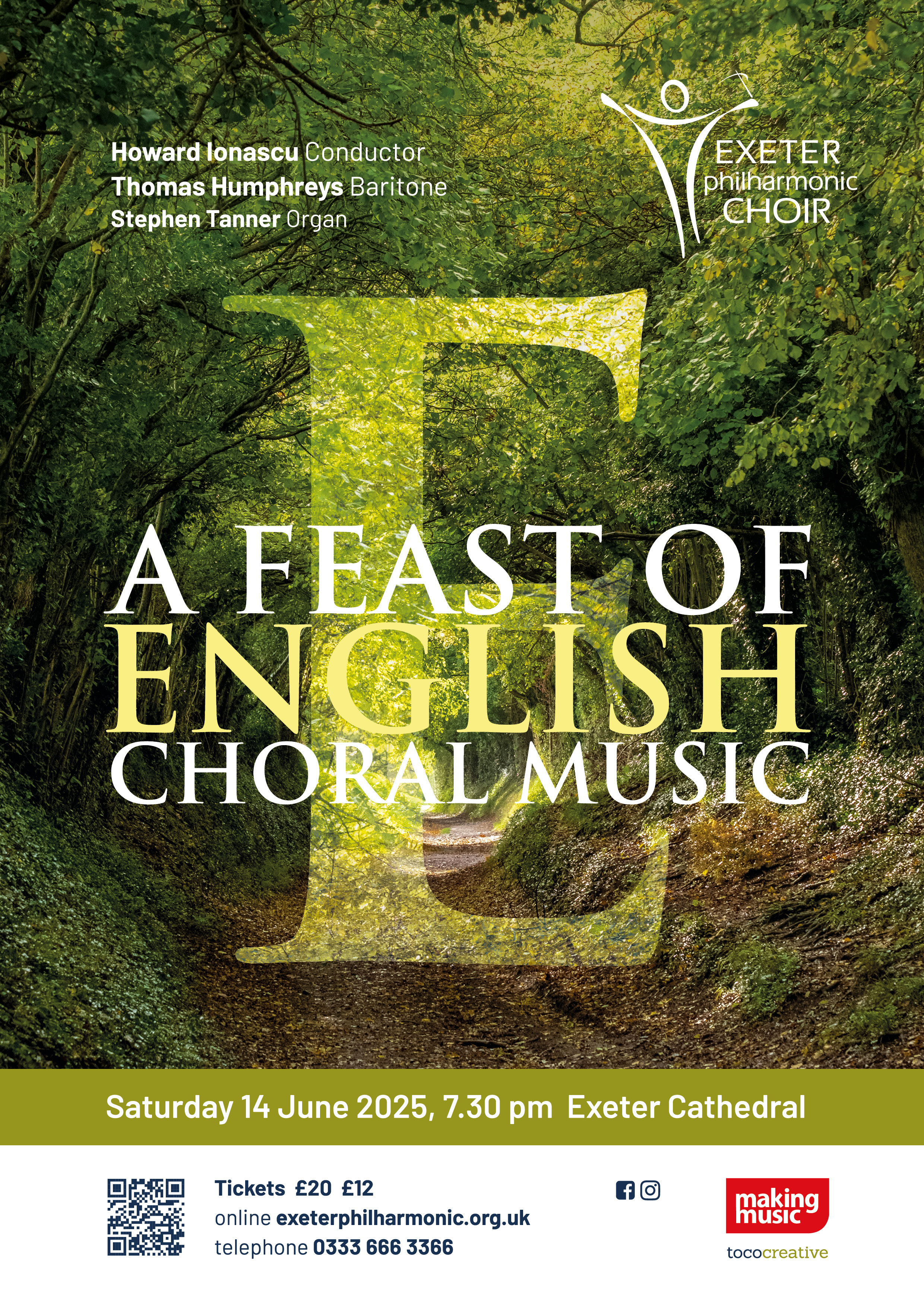
Beginning with Parry’s magnificent I was Glad, the audience knew they were in for a wonderful evening of music-making, with crisp dotted rhythms, a rich tone and perfectly balanced sound. This was followed by a moment of inspiration, with Parry’s contrasting Crossing the Bar performed a cappella and from memory. This heightened the level of communication with the audience and we were able to enjoy the lovely long phrases and light and shade of the piece even more. To repeat the work at the start of the second half in a new area of the Cathedral, to enable a different acoustic and soundscape for the audience, was an added bonus!
The highlight of the concert, for me, was Vaughan Williams’ Five Mystical Songs, where the choir were joined by baritone Thomas Humphreys. The soloist’s beautiful tone, warmth and sincerity were matched by the sensitive organ accompaniment of Stephen Tanner, who produced a fine array of colours from the organ that never over-powered. From the meditative ‘I Got Me Flowers’ to the clarion calls of the ‘Antiphon’, the full power and sensitivity of the choir were on display under the direction of Howard Ionascu.
In Balfour Gardiner’s Evening Hymn the choir continued to excel, with a confident and engaging start. They expertly maintained their pitch in the extended a cappella section and the sensitivity of the final note was left hanging in the air. Sullivan’s popular The Lost Chord gave the audience another chance to enjoy the lyrical voice of Thomas Humphreys, and it was a real treat to hear the organ being expertly showcased by Stephen Tanner in the music of Bairstow and Howells.
The final two works brought fresh challenges for the choir, all of which were met: from the beautiful unison singing at the opening of Elgar’s The Spirit of the Lord, where the choir acted as one voice, to the complex contrapuntal entries of Parry’s Blest Pair of Sirens and its glorious, uplifting finale.
The words of the poet Milton in the closing work summed up the evening perfectly: a concert featuring the ‘sphere-born harmonious sisters, voice and verse’ and a choir, soloist and organist who ‘wed their divine sounds’, leaving the audience to depart with smiles on their faces.
Angela Blackwell
'Bold, vital and joyful': an evening of music by Mozart
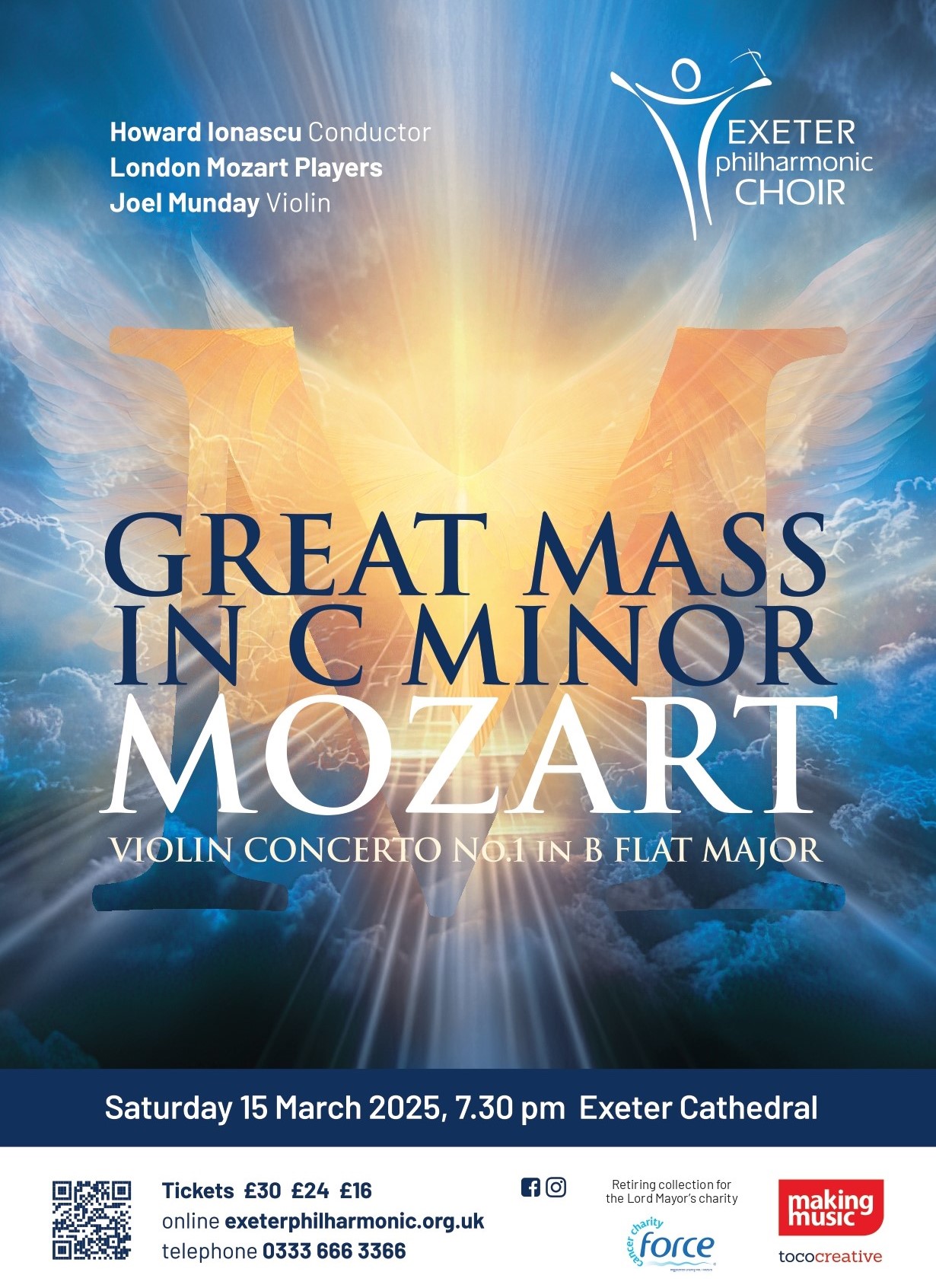
First up was Regina Caeli (‘O Queen of Heaven’), K 276, a splendid means over its short seven minutes of introducing choir and orchestra, together with soloists soprano Lucinda Cox, alto Pip Gascoigne-Pees, tenor Ruairi Bowen and bass Tim Mirfin. The well-blended group of soloists, choir and orchestra delivered a spirited and enjoyable overture to the evening.
This air of spirited enjoyment spilled over to Joel Munday’s performance of Mozart’s 1st Violin Concerto, K 207. His reputation, already well known in Devon, is spreading beyond the county’s borders. From his playing, with a clean, fresh attack and a beautiful line, one can understand why. No showy pyrotechnics here, but sensitivity to the dialogue between soloist and orchestra that Mozart envisaged in this and the other violin concertos that were to follow. And, of course, the LMP, under Howard Ionascu’s lively direction, knows exactly how to meet Mozart’s expectations!
For the final item before the interval, we returned to choir and orchestra for Laudate Dominum (from Vesperae solennes de confessore, K 339), with Daisy Walford as soloist. This was sung with confidence, with good balance between choir and orchestra. Did I miss, though, a sense of wonder?
And so to the C minor Mass for the second half of the concert, unfinished by the composer (missing large parts of the traditional Credo and the whole Agnus Dei). Incomplete it may be, but the Mass, together with the Requiem (also incomplete, of course), represents Mozart’s greatest contribution to church music. The monumental pomp and solemnity of the choral sections were well met by the choir, bold where necessary but aware also of the variations in dynamics demanded by the conductor. Mozart’s double choruses were met with seeming ease; the Gloria’s ‘Cum Sancto Spiritu’ fugue was appropriately vital, the Credo was delivered with real belief and the closing ‘Hosannas’ in the Sanctus and Benedictus were alive and joyful. Throughout, the choir had the luxury of being accompanied by the LMP, beautifully balanced both internally and with the singers.
The solo work within the Mass falls principally to two sopranos, in this case with Daisy Walford joining Lucinda Cox. They were a joy to hear, virtuosic and agile, and the slightly different timbres of their voices in the brief but florid duet, ‘Domine Deus’, made a pleasing contrast. Mozart intended three of the soprano arias for his beloved Constanze, and his delicious orchestral scoring (LMP woodwind to the fore!) of ‘Et incarnatus est’ was a real pleasure to hear in support of Lucinda Cox’s beautiful performance, while Daisy Walford was equally effective in the earlier ‘Laudamus te’. One feels for the tenor and bass soloists, who have so little to sing in this work; what would Mozart have provided them with if he had completed it? Ruairi Bowen joined the two sopranos to good effect in the ‘Quoniam’, but Tim Mirfin had to wait until the concluding Benedictus before joining his three colleagues to provide a fine platform for the ensuing choral ‘Hosanna’.
With soloists, choir and orchestra authoritatively led by Howard Ionascu, the EPC continues to be in good shape! It was appropriate that this memorable occasion was the EPC’s annual Lord Mayor’s concert, with a retiring collection benefiting the Lord Mayor’s chosen charity, FORCE.
David Batty
An evening of high drama and thrills
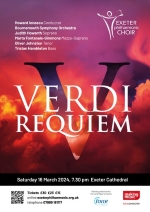
With Verdi's Requiem, the Exeter Philharmonic Choir, directed by Howard Ionascu, brought one of music’s greatest choral works to Exeter Cathedral on 16 March. The Requiem, of course, demands large-scale forces for maximum effect, duly provided by a choir of 117 singers (or so I counted in the programme) and the luxury of the Bournemouth Symphony Orchestra fresh from its own performance of the work in Poole a fortnight or so previously. With a well-matched quartet of soloists – Judith Howarth (soprano), Marta Fontanals-Simmons (mezzo-soprano), Oliver Johnston (tenor) and Ossian Huskinson (bass) – and a sold-out Cathedral, the stage was set for a dramatic evening.
Verdi brought a sense of operatic theatricality to his setting of the Mass, with grandeur and drama in equal measure; and excitement was a-plenty as the evening unfolded. The opening movement, Requiem and Kyrie, introduced us early to the excellence of the performers – soloists, choir and orchestra alike. Then the Dies irae’s picture of the day of wrath came over thrillingly, with the choir’s energetic singing spurred on by a fine bass drum and superb orchestral brass, the latter then moving to even greater volume in the ‘Tuba mirum’, which the valiant choir found it a challenge to match!
The tension did not slacken with Ossian Huskinson’s authoritative delivery of ‘Mors stupebit.’ I liked the vocal shading he brought to his role in the Requiem, both here and in the later ‘Confutatis maledictis.’ Soloists and choir combined effectively in the dramatic contrasts of the ‘Rex tremendae’, while immediately after the interval the choir brought an attractive lilt to its performance of the fourth movement, Sanctus.
But the Requiem is not all blood and thunder; Verdi brought to it much beauty and lyricism. The soloists were the main protagonists in presenting this side of the work, singing expressively as a genuine partnership, for instance, in movement 3, Offertory, at the end of which the Bournemouth strings played the orchestral postlude most beautifully. The orchestra also provided sensitive support to the three lower soloists’ moving performance of movement 6, Lux aeterna, introduced by Marta Fontanals-Simmons' lovely singing, which we had also heard earlier in the ‘Liber scriptus’ and, with soprano Judith Howarth, ‘Recordare’ sections of the Dies irae. When accompanying these more meditative elements of the work, Howard Ionascu ensured that the choir gave careful and effective attention to internal balance and dynamics.
All the different emotions of the Requiem were tied together in the concluding Libera me, where Judith Howarth brought her years of experience and dramatic awareness to a taxing part that takes the soprano soloist up to a high B flat marked ‘pppp’ and, later, the C above, against the fortissimos of choir and orchestra. Here, in the reprise of the Dies irae and in the fugue of the Libera me, as indeed elsewhere during the evening, the EPC singers were in fine voice, with director Howard Ionascu bringing out the best of them. And what a privilege to be accompanied in a major choral work by such a secure and responsive orchestra as the BSO!
The performance rightly attracted much acclaim from the capacity audience. For both them and the performers it was a memorable evening. It was fitting that the occasion was the EPC’s annual Lord Mayor’s Concert, with a retiring collection to benefit the Lord Mayor’s chosen charity, FORCE.
David Batty
Music of the Baroque
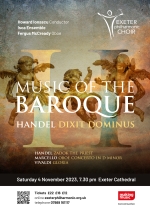
The start of EPC’s new season, coupled with a popular Baroque programme, was clearly a big draw and it was exciting to have a Cathedral full to capacity to hear the glorious music of Handel, Marcello and Vivaldi.
Handel Zadok the Priest provided an uplifting start to the concert, in this coronation year. The choir were in fine form, under the direction of Howard Ionascu, and fully captured the grandeur and majesty of the work.
The more intimate music of Marcello Oboe Concerto in D minor provided a most enjoyable contrast. The soloist, Fergus McCready, accompanied by the Isca Ensemble, produced a beautiful tone, long florid lines and effortless ornamentation, much to the delight of the audience.
The choir then returned with Vivaldi Gloria. Beginning with crisp consonants and dramatic dynamics, we knew we were in for a focused and vibrant performance. The work was performed very slickly, with little rest between movements and creating moments of great contrast; from the warmth of ‘Et in terra pax’ and vocal fizz of ‘Laudamus te’ to the smoothness of ‘Domine Deus’ and majesty of the closing double fugue.
The final item of the programme was Handel Dixit Dominus, composed for five–part choir during his early years in Italy. This piece was full of choral challenges — intricate counterpoint, repeated high notes and glorious suspensions — which the choir more than met, with confident entries, a well-blended choral sound and clear communication with the audience. The three gifted soloists — Lucy Cronin, Ellie Sperling and Martha McLorinan — all produced a wonderful purity of tone, coupled with vocal dexterity, and filled the Cathedral with their voices. They were joined in one movement by Stuart Mole (tenor) and Peter Francis (bass) from the choir; well done, gentlemen! Sensitive basso continuo accompaniment was provided throughout on the organ by the choir’s associate director of music, Stephen Tanner, and by Tirke Linnemann on cello.
With such a confident and accomplished start to the year it is surely going to be a great season for the choir. Well done to all involved!
Angela Blackwell
Monteverdi - Vespers 1610

Exeter Cathedral - Saturday 18 March 2023
Monteverdi – Vespers of 1610
The opportunity to hear Monteverdi’s rarely performed, towering choral work was clearly a big draw and it was wonderful to see a full Cathedral. The audience was fully rewarded, with an evening of music-making that had moments of both intimacy and vocal fireworks.
Under the clear direction of Howard Ionascu, Exeter Philharmonic Choir, the Devon County Junior Choir and His Majestys Sagbutts and Cornetts moved seamlessly between challenging changes in tempo and rhythm with a wonderful sense of ensemble. Highlights included the Laudate pueri (with its variety of textures and virtuosic vocal lines), Audi coelum (with the distant tenor soloist), Lauda Jerusalem (sung with joy by the choir) and the hymn-like Ave Maris Stella (featuring the Devon Youth Choir singing beautifully).
The choir sang throughout with a warm tone and an impressive sense of ensemble. They were finely accompanied by His Majestys Sagbutts and Cornetts, with their highly skilled playing on period instruments. The world class soloists – Amy Carson, Kirsty Hopkins, Peter Davoren, Mark Dobell, Ben Davies and Benjamin McKee – made the highly complex writing sound effortless! At the end of Nigra sum and Pulchra es, no-one in the audience wanted to move or make a sound as they were so transfixed. This could not have happened if the soloists had not been so sensitively accompanied by Paula Chateauneuf on theorbo and the choir’s own Stephen Tanner, on chamber organ.
This was an incredibly ambitious concert and it was a delight to sit in the Cathedral, enveloped by sound, and to reflect on the music that would have been heard there so many centuries ago. Congratulations to everyone on producing an evening of music ranging from the devout to magnificent splendour!
Angela Blackwell
Gloria
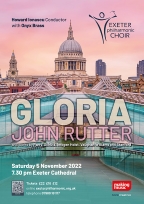
CHOIR AND BRASS CELEBRATE ON BONFIRE NIGHT
Early publicity for the Exeter Philharmonic Choir's autumn concert at Exeter Cathedral on Saturday 5 November indicated that it would mark the Queen's Platinum Jubilee but, of course, subsequent events sadly took over. Nevertheless, the occasion's planned content was retained and the evening's audience, limited in number perhaps due to the concert's clash with Bonfire Night, was richly entertained by an evening of music which was certainly fit to celebrate Queen Elizabeth's long life and reign.
For the evening's music, the choir was joined by an augmented London-based Onyx Brass (including percussion), who opened each half of the concert with the glittering sounds of fanfares by Arthur Bliss, one-time Master of the Queen's Music. The first half continued with brass and organ providing the accompaniment for the choir in Hubert Parry's I Was Glad, sung at every coronation since 1902 and here with the EPC in full voice in a grand, if perhaps overly stately, performance.
With the instrumental resources available to him, EPC Director of Music Howard Ionascu adopted an unusual solution to the antiphonal character of Heinrich Schütz's normally unaccompanied two-choir setting of Psalm 100, Jauchzet dem Herren alle Welt, where he allotted the second choir part (which largely repeats and answers that of the first choir) to the brass. The arrangement, enthusiastically performed, certainly seemed to emphasise the Psalm's air of acclamation.
A short breather for the choir was provided by Onyx Brass performing Imogen Holst's Leiston Suite for brass quartet, a work composed in 1967 but forgotten until 2018 and comprising five brief movements. Onyx Brass were responsible for uncovering this work and although short (just six minutes or so in length), the performance demonstrated the Suite as a characterful addition to the brass repertoire.
Now, unusually, the performance of Vaughan Williams' O, Clap Your Hands set this reviewer a challenge, as it was sung twice because Mr Ionascu decided that the first attempt had not started as it might. Perhaps all I should report is that the second performance was sung with enthusiasm and accuracy, which made for a celebratory conclusion to the first half of the concert.
In contrast to the music so far heard, Charles Villiers Stanford's For Lo, I Raise Up is a tougher, more dramatic work drawing on Habakkuk’s Old Testament prophecies. Composed in 1914 (but not published, ironically, until 1939), it mirrors Stanford's horror of the war that was developing in Europe. With admirable diction, the performance reflected well the anthem's initial anger before moving to the prophet's concluding conciliatory message about deliverance.
Onyx Brass followed with their arrangements of two fugues from The Well-Tempered Clavier by J S Bach, in which the interplay between instruments was most enjoyable – the tuba's agility is not always appreciated!
The concert concluded with choir and brass combining for its principal work, John Rutter's popular Gloria, composed in 1974. The introspective second movement was impressive in expression and tuning, with Rutter's ethereal effects allowed real sensitivity in the performance, led by the organ (expertly played by Stephen Tanner, as elsewhere during the concert), and building around the words 'Domine Deus' to a beautifully graded climax in the middle of the movement. Appreciation should be recorded of those members of the EPC who sang short solos both here and in the Stanford anthem. Choir, brass, percussion and organ sounded resplendent in the energetic first and third movements, in particular in their accommodating the fast tempo set for the latter, with the concert finishing with a real sparkle – all the more appropriate for Bonfire Night!
David Batty
Sacred Jazz
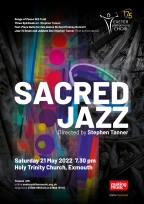
A CONCERT WITH A SWING!
When did you last see a large choral society obviously enjoying themselves during a performance? I don't just mean after the event when the singers are enthusing about an evening's music making, but actually during a concert, with smiles and joy on their faces. Well, this was certainly the case at the Exeter Philharmonic Choir's summer concert on Saturday 21 May at Holy Trinity Church, Exmouth, and none more so than during the first performance of Stephen Tanner's Jazz Te Deum and Jubilate Deo.
The concert, conducted by Stephen Tanner, the Choir's Associate Director of Music, focused on the theme of Sacred Jazz, a concept carefully explained in Tanner's programme notes for the occasion. His new work fused two familiar sacred texts with music in the jazz idiom composed during the coronavirus pandemic lockdown. The Choir brought an infectious swing to the piece enhanced by the combination of saxophone, piano, double bass and drums that provided the instrumental accompaniment. The beautiful and atmospheric playing of saxophonist Steve Wiltshire was especially effective in sustaining the special jazz idiom that underpinned Tanner's ambitions, but Andrew Downton (piano), Phil Williams (bass) and Ryan Carter (drums) all had their part to play in a successful first performance, which was met with warm and prolonged applause from the large audience. The work deserves a second outing, and more!
Earlier in the concert, Stephen Tanner conducted the Choir in three traditional spirituals in his own, effective arrangements (I especially enjoyed Didn't my Lord deliver Daniel?), while he then joined Andrew Downton in a performance of Richard Rodney Bennett's Four Piece Suite: Divertimento for Two Pianos, a lively composition touching on samba, country blues and ragtime, perhaps not helped on this occasion by the heavy bass of the two electric pianos. The concert had opened with music by Will Todd, a composer who has made a prominent name for himself in a wide range of musical styles including his jazz-based Mass in Blue. On this occasion we heard another jazz-infused work, four of the six songs that make up Todd's Songs of Peace, quieter in mood than the Tanner work, but well performed by the ever-attentive Choir and the accompaniment of piano, bass and drums.
The concert's repertoire could have presented a real challenge for the EPC singers as they moved outside their usual comfort zone of choral classics, but they met the challenge with lots of enthusiasm, accuracy, smiling faces …... and swing!
David Batty
Brahms Ein deutsches Requiem
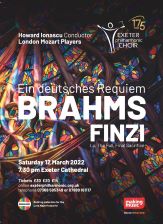
Celebrating 175 years of performance
This Requiem is not a liturgical work as such, with Brahms choosing not to set the traditional words of the Mass. Although the composer's approach towards the Christian faith seems to have been somewhat ambivalent – Christ's name is not mentioned in the work – nevertheless he seems to have known his Bible well, with a carefully considered choice of the texts from the Old and New Testaments that comprise the Requiem. Through these words, the work takes us on a journey from anxiety to consolation, often within the same movement.
For conductor Howard Ionascu this work presented a real challenge. The choir sings in all seven movements, which represents a demanding stay of stamina throughout the 60+ minutes of the work. Even a short interval at this performance between movements III and IV offered little respite! But Howard Ionascu and his EPC forces are to be admired for keeping the energy levels so high, with no less vigour in the great fugue of the sixth movement than that which ends the third. Some frailties in choral entries and ensemble notwithstanding, the performance gave the audience a real sense of the mix of anguish (or as Ernest Newman put it, 'drastic, grisly paintings of the nothingness of man') and consolation that is such a feature of the work. Diction of the German text was good.
Two fine singers took on the solo roles. Jessica Cale's beautiful soprano voice, easily encompassing the high tessitura of her part, led the consolatory fifth movement in a reflective and moving manner. Singing in the third and sixth movements, baritone Timothy Nelson brought an impressive, lieder-like freshness to his performance, with an authoritative feeling for both text and music.
Accompanying the EPC were the London Mozart Players, who provided warm, high quality support: how good, for instance, to have a rich foundation to the slow tread of 'Denn alles Fleisch es ist wie Gras' (‘For all flesh is grass’) at the start of the second movement. As ever in the Cathedral acoustic, however, and despite Brahms' often careful orchestral support for the singers, there were times, particularly in the two grand fugues, when the choir seemed to retreat behind a wall of brass and timpani. The clarity of words was lost, though the mood of joyful consolation was somehow maintained.
Before the Requiem, the concert offered us a rare performance of Gerald Finzi's Lo, The Full, Final Sacrifice, originally written (in 1946) with organ accompaniment but here heard in an orchestral guise very much in the English pastoral tradition. This is a lovely work set to words by the 17th century Richard Crashaw drawn from writings by St Thomas Aquinas on the theme of the Blessed Sacrament and well worth hearing for the first time. I enjoyed the choir's careful attention to the work's dynamics though, as with the Brahms, the balance between voices and orchestra was occasionally challenged in forte climaxes. The performance included short solo contributions from EPC members, tenor Stuart Mole and bass Martin Stubbings.
Howard Ionascu and his performers are to be congratulated on such an enjoyable concert, which was the Exeter Philharmonic Choir's annual performance in aid of the Lord Mayor's Charity, on this occasion Inclusive Exeter.
David Batty
Beethoven Missa Solemnis

MISSA SOLEMNIS MARCH 2020
The Exeter Philharmonic Choir's celebration of the 250th anniversary of Beethoven's birth could not have been more ambitious at the concert it gave at Exeter Cathedral on 14 March 2020. Any choir facing one of the Everest's of classical choral music, the Missa Solemnis, must meet so many challenges that Beethoven lays before it – the dramatic contrasts in dynamics and tempi, alarmingly regular visits above the stave, and two of the most difficult fugues facing any large choir; and then, specific to this concert, the acoustic of a venue that favours orchestra over choir in a big choral work.
It is little wonder, therefore, that this greatest of Masses is rarely performed and, when it is, would benefit from a firm orchestral foundation, on this occasion provided by the excellent English Chamber Orchestra and evident from the start of the opening Kyrie. It was a real asset to hear Beethoven's often innovative accompaniment, in the Agnus Dei for instance, played so confidently under conductor Howard Ionascu's dynamic direction. Perhaps this confidence encouraged a prominence to the orchestral sound that in the Gloria and Credo at times overwhelmed the Choir's contribution. But the experience of hearing these two particular movements, taken at brisk tempi which energetically drove the music forward to the heights of celebration, was undeniably exciting. In particular, there was no slackening in the Choir's singing of the movements' vast concluding fugues which left audience members on the edge of their seats.
If the preceding movements depend on the chorus driving forward the energy of the music, then it is the soloists who must carry the succeeding, more contemplative Sanctus, Benedictus and Agnus Dei. Here the performance owed much to the fine team of distinguished soloists, Emma Tring (soprano), Marta Fontanals-Simmons (alto), Peter Auty (Tenor) and Robert Davies (bass). The composer's extraordinary conception for the Benedictus, dependent on a solo violin (most sensitively played by the ECO's leader, John Mills) hovering ethereally around the four soloists, was beautifully effective.
Beethoven's setting of the concluding Agnus Dei again takes us into new territory, with the singers' contributions interrupted by the orchestra with martial interjections and a presto orchestral fugue – no quiet resolution here to the Mass. The soloists set their mark on the special pleadings of this movement, while the Choir (with an effective lilt to its delivery of Dona nobis pacem) also showed the ability to sing with real sensitivity (and here and elsewhere, just the occasional entry hesitation) in the quieter moments.
Against the background of the Coronavirus crisis, it was slightly disappointing that audience numbers were not as great as they might have been for such an impressive concert. For those able to attend, it was as a privilege to hear the Missa Solemnis in a performance that presented the work as the uplifting masterpiece that it undoubtedly is. Howard Ionascu and his Choir are to be congratulated on taking the opportunity of the composer's birth celebrations to share with us Beethoven's grand confession of faith.
This particular event was the Exeter Philharmonic Choir's annual concert in aid of the Lord Mayor's Charity, on this occasion the City Community Trust.
David Batty

.jpg)
